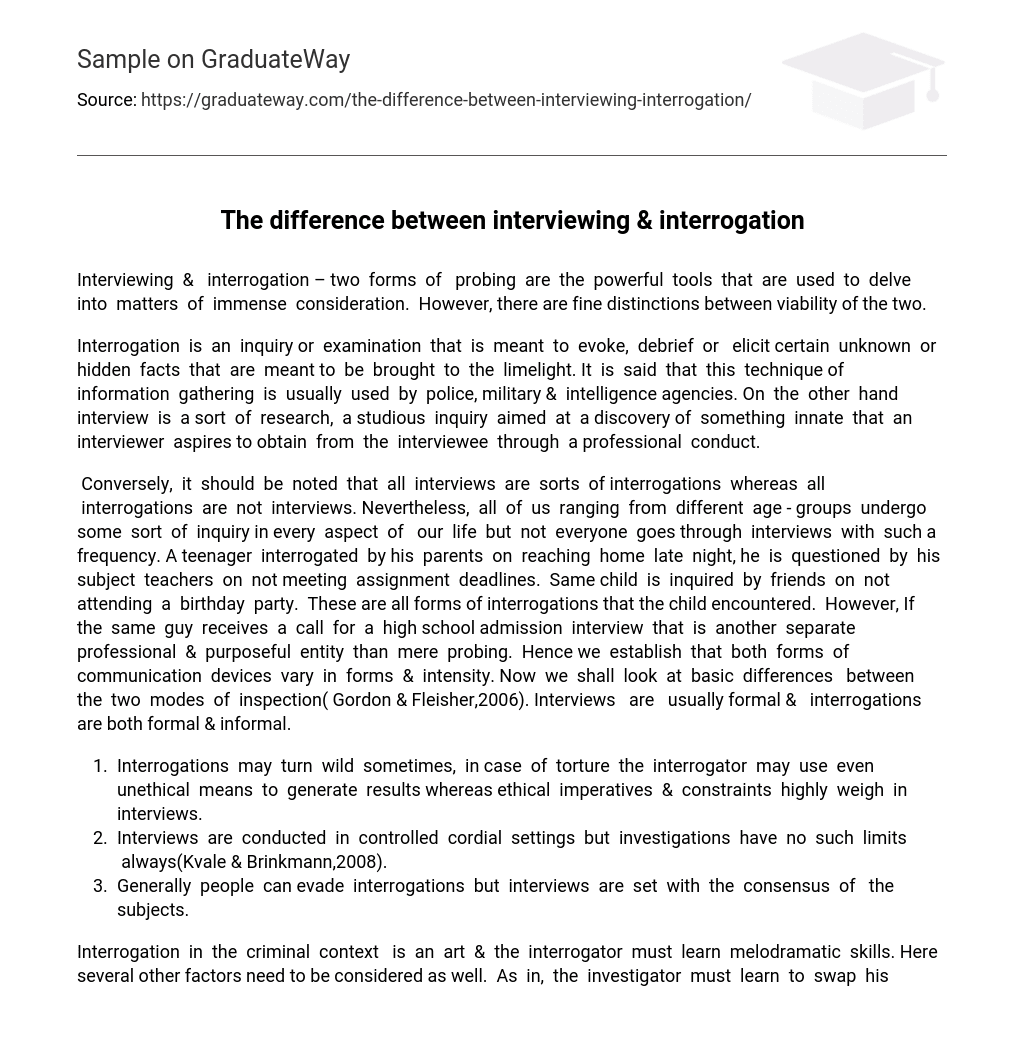Interviewing & interrogation – two forms of probing are the powerful tools that are used to delve into matters of immense consideration. However, there are fine distinctions between viability of the two.
Interrogation is an inquiry or examination that is meant to evoke, debrief or elicit certain unknown or hidden facts that are meant to be brought to the limelight. It is said that this technique of information gathering is usually used by police, military & intelligence agencies. On the other hand interview is a sort of research, a studious inquiry aimed at a discovery of something innate that an interviewer aspires to obtain from the interviewee through a professional conduct.
Conversely, it should be noted that all interviews are sorts of interrogations whereas all interrogations are not interviews. Nevertheless, all of us ranging from different age – groups undergo some sort of inquiry in every aspect of our life but not everyone goes through interviews with such a frequency. A teenager interrogated by his parents on reaching home late night, he is questioned by his subject teachers on not meeting assignment deadlines. Same child is inquired by friends on not attending a birthday party. These are all forms of interrogations that the child encountered. However, If the same guy receives a call for a high school admission interview that is another separate professional & purposeful entity than mere probing. Hence we establish that both forms of communication devices vary in forms & intensity. Now we shall look at basic differences between the two modes of inspection( Gordon & Fleisher,2006). Interviews are usually formal & interrogations are both formal & informal.
- Interrogations may turn wild sometimes, in case of torture the interrogator may use even unethical means to generate results whereas ethical imperatives & constraints highly weigh in interviews.
- Interviews are conducted in controlled cordial settings but investigations have no such limits always(Kvale & Brinkmann,2008).
- Generally people can evade interrogations but interviews are set with the consensus of the subjects.
Interrogation in the criminal context is an art & the interrogator must learn melodramatic skills. Here several other factors need to be considered as well. As in, the investigator must learn to swap his roles cause his suspects may range from different age groups & professions. They may be lawyers, doctors, housewives or juvenile delinquents. Hence, the investigator may be able to obtain desired confessions from suspects creating a comfort zone & rapport. It is important to perform the task in a small controlled, sound-insulated room void of distractions. Interrogators must avoid rooms that have clocks, telephones, intercoms etc, cause those can cause distractions to both people involved in the process. To psychologically trap such subjects using all possible techniques we must consider subject’s verbal & non-verbal gestures as well. In this case creating an eye- contact is also mandatory. It provides an insight if interrogator can read faces & eye movements(Kvale & Brinkmann,2008).
Besides, interrogator must have a documented form of the case he is investigating, to consult the papers for information about the case as well as subject’s background. He must also jot down the key facts or results being obtained from the process. Apart from inquiring & probing there must be argumentative points on which to counter question. In order to create such argumentative modes the interrogator should be analytical enough to gauge critical facts or confessions on whom further line of reason can be built.
A specific time frame should be allotted to the whole process in order to make it comprehensive & well-built. In the end, the investigator must understand the fact that even after such prudent & thorough investigations some questions would still remain unanswered, which can be catered or further worked upon as the whole interrogatory process is based on trial & error method.
In recent trends criminal interrogations have become infamous & have taken very brutally harsh forms, defying the true spirit of investigations. Partly, because of the tactics adopted in the name of enhanced interrogation techniques or alternative set of procedures, the phrase assumed by the George W. Bush administration in the United States to describe interrogation methods used by US military intelligence and the Central Intelligence Agency (CIA) to extract information from individuals captured in the war on terror soon after the September 11 attacks in 2001(Alexander & Bruning, 200).
Stories continue to be concocted explaining the real face of tactics which can be termed as even torture. I feel skeptic about adding the mental tortures in the category of any sort of investigations. However, places like Guantanamo bay sound synonymous to torture cells where criminals are tormented to the utmost degree leaving numerous innocents mentally upset as a result.
To recapitulate, both tools have their own pros & cons with varying intensity levels. It is up to the researcher or seeker of the truth to deploy a method which can bring forward the best possible results, for both are meant to clear doubts & obtain apparent repercussions.
References:
- Alexander, M. & Bruning, J.(2008). How to Break a Terrorist: The U.S. Interrogators Who Used Brains, Not Brutality, to Take Down the Deadliest Man in Iraq. Free Press
- Gordon, N.J. & Fleisher, W.L.(2006). Effective Interviewing and Interrogation Techniques. Academic Press
- Kvale, S. & Brinkmann, S.(2008). Interviews: Learning the Craft of Qualitative Research Interviewing. Sage Publications





